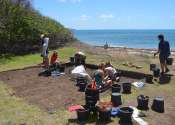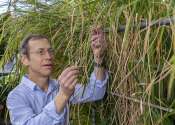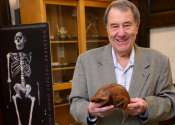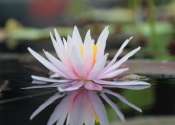
Caribbean settlement began in Greater Antilles, researchers say
A fresh, comprehensive look at archaeological data suggests that seafaring South Americans settled first on the large northernmost islands of the Greater Antilles rather than gradually moving northward from the much closer, ...

Grain traits traced to 'dark matter' of rice genome
Domesticated rice has fatter seed grains with higher starch content than its wild rice relatives—the result of many generations of preferential seed sorting and sowing. But even though rice was the first crop to be fully ...

Study reveals domestic horse breed has third-lowest genetic diversity
A new study by Dr. Gus Cothran, professor emeritus at the Texas A&M School of Veterinary Medicine & Biomedical Sciences (CVM), has found that the Cleveland Bay (CB) horse breed has the third-lowest genetic variation level ...

Researchers determine age for last known settlement by a direct ancestor to modern humans
Homo erectus, one of modern humans' direct ancestors, was a wandering bunch. After the species dispersed from Africa about two million years ago, it colonized the ancient world, which included Asia and possibly Europe.

New insights into the formation of Earth's crust
New research from Mauricio Ibanez-Mejia, an assistant professor of Earth and environmental sciences at the University of Rochester, gives scientists better insight into the geological processes responsible for the formation ...

Mowing urban lawns less intensely increases biodiversity, saves money and reduces pests
The researchers combined data across North America and Europe using a meta-analysis, a way of aggregating results from multiple studies to increase statistical strength. They found strong evidence that increased mowing intensity ...

Study: Human management helps rare plants, butterflies survive hurricane
A new study from North Carolina State University shows that ongoing habitat management could help prevent hurricane-driven extinctions. The study found that a rare Florida plant, the pineland croton, weathered the damage ...

Air travel reduces local investment bias, benefits investors and firms, study shows
Easy access to air travel has not only flattened the world, it also has flattened the bias toward investing locally, according to new research from the University of Notre Dame

Global urban growth typified by suburbs, not skyscrapers
To many people, the term "urban growth" connotes shiny new high-rise buildings or towering skyscrapers. But in a new analysis of 478 cities with populations of more than 1 million people, researchers at the Yale School of ...

Mentoring project deepened student learning, commitment
Pairing graduate students with professionals working in their field resulted in deeper learning and inspired passion for the work, according to new research from the University of Houston.

Scientists identify harmful bacteria based on its DNA at a very low cost
A new bacterial identification method, called ON-rep-seq, examines selective, strain-specific fragments of the bacterial genome, allowing the generation of results that earlier required DNA sequencing of the entire bacterial ...

The delicate water lily: A rose by another name?
A new study published in Nature reports the 409-megabase genome sequence of the blue-petal water lily (Nymphaea colorata). The conclusion of the 47 coauthors is that although a rose is a rose, most flowering plants may owe ...

Whether children will enjoy academic success can be now predicted at birth, a new study suggests.
Europe's exoplanet hunter reaches orbit around Earth
Europe's CHEOPS planet-hunting space telescope left Earth on Wednesday and moved into orbit, a day after its lift-off was delayed by a technical rocket glitch during the final countdown.
Mangroves on the run find a more northern home
The north might no longer be as inhospitable to mangroves as it once was.

Weather officials: 24 tornadoes hit South over 2 days
At least two dozen tornadoes hit the Southeast this week in a deadly outbreak of severe weather, assessments by the National Weather Service show.
Social sciences researchers develop new tool to assess exposure to childhood violence, trauma
One in five children in Cuyahoga County, Ohio, are either exposed to, or are victims of, violence and trauma, according to a new study from the Jack, Joseph and Morton Mandel School of Applied Social Sciences at Case Western ...

Little reason for moral panicking after #MeTo
Yes, you can still give a colleague a regular hug, even after #MeToo. The boundaries are usually a little broader than you might imagine from googling the topic.

Scientists identify harmful bacteria based on its DNA at a very low cost
A new bacterial identification method, called ON-rep-seq, examines selective, strain-specific fragments of the bacterial genome, allowing the generation of results that earlier required DNA sequencing of the entire bacterial ...
Sydney's desalination discharge boosts fish life in time of climate uncertainty
In a time of global climate uncertainty and growing populations, reliance on alternative sources of drinking waters is ever-increasing. New research, led by Southern Cross University, has found an unexpected benefit at the ...

That public playground is good for your kids and your wallet
If you live near a public playground it can be a convenient outdoor destination for short excursions and a life-saving source of pressure relief when the kids are too surly to bear inside the house. But in research, published ...

No comments:
Post a Comment